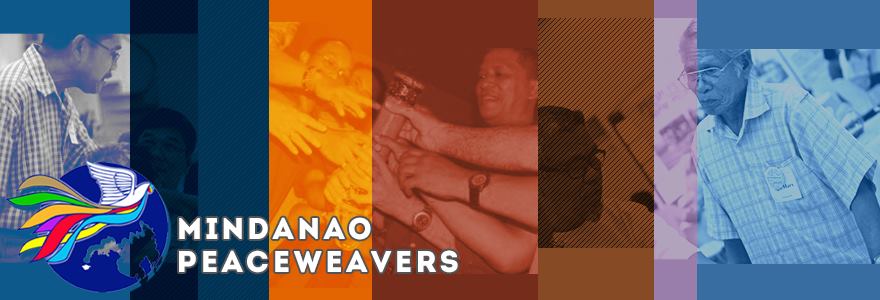The Mindanao Peaceweavers (MPW), a coming together of eight (8) peace networks in Mindanao with solidarity networks in Manila and Visayas, is at the forefront of creating public spaces for consensus-building among its constituencies, civil society, as well as with conflict actors and key stakeholders to peace in Mindanao.
MPW has stood its ground and affirmed its call for a negotiated political settlement of the armed conflict in Mindanao for more than ten (10) years.
MPW celebrated when the GPH and MILF peace talks made inroads in widening the common ground as the peace actors work out the kinks and untangle the knots of the substantive agenda of the negotiations one at a time until it reached the historic Framework Agreement on the Bangsamoro (FAB) and Annexes breakthroughs.
MPW remains committed to engage the peace process by bringing it closer to the public and feeding into the entire process its own take on citizen participation.
While a new dawn is approaching the Muslim region, MPW endeavors to develop concrete proposals hinged upon its avowed guiding principles and submit to the Bangsamoro Transition Commission (BTC) in crafting the basic law. And consequently engage the other transition mechanisms, joint commissions and entities expressed in the FAB Annexes through actual policy proposal submission and participation. [Culled from MPW proposal on transition mechanisms submitted last July 2012 to the negotiating panels] :
1. Principle on Right to Self Determination.
MPW enjoins the GPH and MILF to further cement the foundation of the peace negotiations and its outcome by recognizing and manifestly expressing the principle of the Right to Self-Determination (RSD) as the cornerstone for peace in Mindanao. Bangsamoro self-governance is at its finest when there is broad and meaningful participation of peoples in crafting the desired political formula.
2. Principle on Inclusivity.
Convergence means not leaving anyone behind. MPW champions inclusivity in governance wherein there is equitable representation in terms of gender, identities and cultures. Specifically, the Lumad/indigenous peoples should be meaningfully consulted and accorded significant participation in both structure and process.
3. Principle on Democratic Participation.
MPW is all about participation. It adheres to and upholds democratic principles in all its processes. It promotes meaningful participation of peoples as it engages everyone in political processes without discrimination and judgment. This principle builds on social capital through consultative decision-making that involves the Bangsamoro, Christian settlers, Indigenous Peoples, women, youth, and other marginalized sectors in the society.
4. Principle on Transparency.
Information is liberating; it empowers. MPW believes when people have greater access to information on the talks and the peace process in general, a highly-politicized public who are the ultimate gatekeepers of the change agenda is nurtured.
5. Principle on Dialogue.
Dialogue is vital in any change process especially when the clarion call towards unity and reconciliation is reverberating. Hence, MPW supports the full realization of all peace processes. It specifically respects the review of the 1996 Final Peace Agreement between the MNLF and the GPH. MPW believes that the MNLF peace process must be finally resolved. Moreover, the spirit of dialogue has to permeate the public. MPW is obliged to communicate the right messages to its constituency and promote sobriety, and not confusion nor distorted information that fan animosity in this delicate stage of the peace process.
6. Principle on Subsidiarity.
Genuine development and growth can be achieved by respecting the inherent powers and capacities of local peoples and local ethnic groups. MPW invokes the principle of subsidiarity since decision-making occurs at the level at which the people most directly concerned can take responsibility.
7. Principle on Mutual Respect.
Trust-building should be held in continuum in any peace process. MPW firmly believes that the climate of trust and respect should be nurtured by the key stakeholders. It is the primary condition that will help maintain the partnership among equals ready to overcome a seemingly challenging process.
8. Principle on Sustainability and Social Justice.
The signed agreements, basic law and its subsequent implementation have to factor in the twin principles of sustainability and social justice. Sustainability ensures that all decisions made will “meet the needs of the present and future generations”. MPW abides with Sustainable Development as a guidepost to guarantee the financial and economic soundness of the propositions without compromising the ethics on Equity. Herein lies the concept of social justice as a foundation in developing policies directed with “impartiality, fairness and justice” to all stakeholders of peace and development.

No comments yet.